|
|
|
Sort Order |
|
|
|
Items / Page
|
|
|
|
|
|
|
| Srl | Item |
| 1 |
ID:
136939


|
|
|
|
|
| Summary/Abstract |
Europe is a profoundly flexible concept and, in Ernesto Laclau’s terms, a ‘floating signifier’ which is given various meanings depending on the speaker’s political aims. The article focuses on current populist and nationalist political discourses in Finland and the articulation of Europe and European identity in the political rhetoric of The Finns Party. In the rhetoric, Europe is given contradictory meanings. On the one hand, it is perceived as a cultural and value-based community which shares a common (Christian) heritage and values. Identification with Europe and the promotion of European communality are particularly pronounced when a threat towards ‘us’ is experienced as coming from outside the imagined European borders. On the other hand, the European integration process and Europe as a political project can be articulated as threats not only to national independence, identity and cultural particularity but to European cultural identity as well.
|
|
|
|
|
|
|
|
|
|
|
|
|
|
|
|
| 2 |
ID:
136119
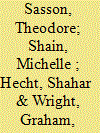

|
|
|
|
|
| Summary/Abstract |
Taglit-Birthright Israel has brought hundreds of thousands of diaspora Jewish young adults on tours of Israel. Drawing on data from a large-scale program evaluation, we ask how the program affects participants’ feelings of homeland attachment and political views on contentious homeland issues. North Americans who traveled to Israel with Taglit between 2010 and 2012 were surveyed together with a comparison group of applicants to the program who did not participate. In multivariate analysis, Taglit sharply increases feelings of connection to Israel but has no effect on attitudes concerning the future of Jewish settlements in the West Bank. The program modestly increases scores on a “favorability” scale and modestly increases opposition to a possible division of Jerusalem in a future peace deal. In contrast to Benedict Anderson's theory of long-distance nationalism, the findings suggest that feelings of homeland connection can be fostered without triggering ethnonationalist attitudes associated with the political right.
|
|
|
|
|
|
|
|
|
|
|
|
|
|
|
|
| 3 |
ID:
136933


|
|
|
|
|
| Summary/Abstract |
The post-Soviet period in Russia has reached the quarter of a century milestone. The identity crisis widely acknowledged in post-Soviet research in its first two decades opened the way for policies aimed at the consolidation of an encompassing all-Russian (rossiiskaya) national identity1 as a source of nation-building. Contention over political separatism and various regional scenarios of the politics of identity2 are being superseded by the ‘Russian (russkii) question’. Meanwhile strengthening ethnic identities look up to religious, language and cultural landmarks as reference points. The nation-building agenda is thus having to take in different repertoires of contention, and bridging cleavages within Russian society is not only and not primarily a question of elite-tailored politics of identity. It is about the formation and assertion of inclusive identities innate both to the Russian cultural tradition and to the needs of a community confronting the challenges of modernisation.
|
|
|
|
|
|
|
|
|
|
|
|
|
|
|
|
| 4 |
ID:
136605
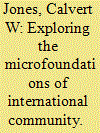

|
|
|
|
|
| Summary/Abstract |
This paper challenges conventional wisdom about the drivers of international community at the individual level. Presenting new data and a novel natural experiment approach to the study of cross-border contact and international community, it tests some of the key microfoundations of international relations theory about how a sense of shared international community may arise and evolve among individuals. The hypotheses are tested using survey data from a large sample (n = 571) of American study abroad students in a range of universities across a treatment and a control group. Surprisingly, findings do not support the main hypothesis that cross-border contact fosters a sense of shared international community. However, the second hypothesis drawn from the liberal paradigm, suggesting that cross-border contact lowers threat perceptions, is strongly supported. The “Huntingtonian” hypothesis that cross-border contact heightens nationalism also garners wide support. The paper concludes with a discussion of the implications for theory and future research, especially the potential of rethinking the drivers of international community at the individual level to rely less on a sense of shared identity and essential sameness, and more on a feeling of “enlightened nationalism” and appreciation for difference
|
|
|
|
|
|
|
|
|
|
|
|
|
|
|
|
| 5 |
ID:
136546


|
|
|
|
|
| Summary/Abstract |
The rise of the Hong Kong local identity vis-à-vis the Chinese national identity has been particularly pronounced in recent years. This article argues that the “Mainlandization” of Hong Kong since 2003 has alienated Hong Kongers and threatened their sense of distinctiveness, which in turn has intensified their resistance to Beijing’s top-down assimilation.
|
|
|
|
|
|
|
|
|
|
|
|
|
|
|
|
| 6 |
ID:
134468


|
|
|
|
|
| Summary/Abstract |
The article argues that Karl Deutsch’s work on nationalism is not only a precursor to his ‘security communities’ but that it is central to his international relations (IR). Nationalism impacts what people expect from the state and influences the state’s international behaviour. While these processes are mostly automatic and cannot be controlled, their trajectories are not fully determined. Deutsch is interested in theorising moments when automatic processes do not suffice or become harmful and intervention is needed. The article first introduces Deutsch as a theorist of nationalism, examining his contribution in the context of the field of nationalism studies and the reasons for his equivocal reception in this field. In its second part, the article makes sense of the legacy of Deutsch’s work on nationalism for contemporary IR by focusing on his use of the notion of self-determination with which Deutsch transcends the normative imperatives of the narrower concept of national self-determination.
|
|
|
|
|
|
|
|
|
|
|
|
|
|
|
|
| 7 |
ID:
134465


|
|
|
|
|
| Summary/Abstract |
In this article, I describe Karl Deutsch’s personal and political background and career and offer an assessment of him as a scholar, teacher, and mentor.
|
|
|
|
|
|
|
|
|
|
|
|
|
|
|
|
| 8 |
ID:
135860


|
|
|
|
|
| Summary/Abstract |
Prior to the 2010 overthrow of Kyrgyzstan's government, there were tangible signs of popular dissatisfaction with the ruling Bakiev regime. Beginning in spring 2008, electricity shortages and forced restrictions became a daily reminder of the government's ineptitude, corruption and regional vulnerability. This article reports the results of a survey and interviews conducted in 2009–10. The results reveal how popular perceptions of energy and water supply shaped the average Kyrgyzstani's frustration with the ruling regime in the year before the revolution. The paper explores how the Bakiev administration attempted to frame the electricity crisis in nationalistic and naturalized ways, and how this framing only partly resonated and created mismatch with daily lived experiences and widespread suspicions of corruption in the hydroenergy sector. Ultimately, this mismatched framing generated collective emotions of shame and blame, creating the context for revolution.
|
|
|
|
|
|
|
|
|
|
|
|
|
|
|
|
| 9 |
ID:
136840
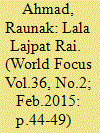

|
|
|
|
|
| Summary/Abstract |
Lala Lajpat Rai’s modern perspective in the social and economic field such as religion, education, community, development etc. together with his strong understanding of his own rich culture, places him as one of the most important reformer of India. His thoughts were the perfect blend of best understanding of the West and East.
|
|
|
|
|
|
|
|
|
|
|
|
|
|
|
|
| 10 |
ID:
136839
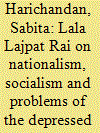

|
|
|
|
|
| Summary/Abstract |
As Gandhi succinctly put it, “it is impossible to think of a single movement in which Lalaji was not linked.” Mr. Oswal Garrison Villard, editor of “Nation” described Lalaji as a wise, brave and sound ambassador, a generous and modest interpreter of great races to American democracy and a profound student of human liberties. Lala Lajpat Rai, Sher-i-Punjab was indeed, a lion both in thoughts and deeds . Contemporary relevance of his thoughts and prescriptions to remove anomalies from Indian society and polity deserve mention.
|
|
|
|
|
|
|
|
|
|
|
|
|
|
|
|
| 11 |
ID:
135887


|
|
|
|
|
| Summary/Abstract |
The article critically evaluates liberal nationalist perspectives on immigration by drawing on findings from a qualitative research project undertaken in 2014 among White British interviewees in England. From one perspective the study's participants' attitudes seem to support arguments made by David Goodhart and other liberal nationalists regarding immigration, social trust and integration. However, further analysis suggests that these attitudes are to a very significant extent drawn first from partially imagined ideas surrounding immigration and second from potentially unreliable sources. These findings thus provoke the question of whether social trust and notions of a national community are actually being disrupted by immigration, or whether they are being disrupted by prejudiced nationalist and xenophobic perceptions about immigration and immigrants. The article will conclude by arguing for more nuanced research into attitudes towards immigration and in favour of a sceptical approach to nationalist frameworks for interpreting society and politics in Britain today.
|
|
|
|
|
|
|
|
|
|
|
|
|
|
|
|
| 12 |
ID:
136853
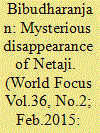

|
|
|
|
|
| Summary/Abstract |
The authenticity of the aircrash on 18 August 1945 remains an enigma, an unsolved mystery, a million dollar question since it holds the clue to Netaji's mysterious disappearance. In order to shed some light on the question, members of Parliament such as Mulka Govind Reddy, Harivishnu Kamath, Prakash Vir Shastri went to Taipe (Fermoza) on a fact finding mission.
|
|
|
|
|
|
|
|
|
|
|
|
|
|
|
|
| 13 |
ID:
136569


|
|
|
|
|
| Summary/Abstract |
“Latin American nationalism is unique in comparison with the nationalisms of other regions in the developing world because it achieved political independence at least a century before it gained social and economic independence.” Fifth in a series on resurgent nationalism around the world.
|
|
|
|
|
|
|
|
|
|
|
|
|
|
|
|
| 14 |
ID:
135772


|
|
|
|
|
| Summary/Abstract |
In this article I explore some of the ways in which consumer discourse related to factory-produced tarag (drinkable yogurt) reflects concerns about food safety and cultural identity in Mongolia. Providing examples of how Mongolian industrial dairy producers position products made from imported milk powder as ‘local’, ‘pure’, and ‘natural’, I contrast consumers’ views of ‘artificial’ or ‘poisonous’ milk from Inner Mongolia (China), uncertainty over the nature of Mongolian milk products, and the increasing terminological confusion brought about by dairy process standardization. This paper draws on an analysis of comments posted to Mongolian-language online news sites, in response to rumours that ‘Goyo Tarag’ – a popular yogurt beverage manufactured by Orgil Foods – might in fact be Chinese in origin.
|
|
|
|
|
|
|
|
|
|
|
|
|
|
|
|
| 15 |
ID:
135147


|
|
|
|
|
| Summary/Abstract |
This article attempts to revisit Nehru’s ideology and to re-contextualise it in an era of globalisation. India has remained the reference point to assess Nehru’s ideology. His idea of nation and nationalism are discussed in the light of the recent attempts to redefine Indian nation and nationalism. Notwithstanding his commitment to secularism, Nehru also attempted to absorb Hindu communalist sentiments in the mainstream of Indian politics but at the same time he treated communalism as a grave threat to India’s integrity. Nehru’s vision to develop modern India not only with the help of science and technology but also by developing a scientific temperament and promoting democratic culture amongst people is the subject of debate. His views regarding the radical transformation of rural society through land reforms and community development programmes are discussed here. Nehru desired to reconcile the modern goals of economic development with traditional community values of small-scale agrarian societies. His contribution to consolidate democracy by gradually attaching the people to parliamentary institutions forms a significant component of this article.
|
|
|
|
|
|
|
|
|
|
|
|
|
|
|
|
| 16 |
ID:
134265


|
|
|
|
|
| Summary/Abstract |
The Hindi-language journal, Sarasvati (1900–82), belonged to a new breed of periodical, the illustrated monthly, emerging in India at the turn of the century. It pursued and established an integral connection between art and literature. In this essay, I examine visually-oriented strategies implemented by the journal's editor, M.P. Dwivedi, to establish literary authority amidst resistance to his poetic agenda. In particular, I focus on two of Dwivedi's earliest attempts at establishing literary authority through combined literary–visual narrative forms: literary criticism conveyed through editorial cartoons, and poetry inspired by, and accompanying, the paintings of Raja Ravi Varma. A closer look at the deliberate cultivation of such literary interactions with the visual provides the basis for a more nuanced history of the modernisation of Hindi poetry and indicates the interactive significance of literature and art across multiple regions in the early twentieth century.
|
|
|
|
|
|
|
|
|
|
|
|
|
|
|
|
| 17 |
ID:
135326


|
|
|
|
|
| Summary/Abstract |
This article sheds light on the development in the relationship between the Lebanese Maronite church and the French colonial authorities during the mid-1930s. It focuses on the confrontational stance of the church toward the French under the leadership of Patriarch Antoine ’Arida (1863-1955). I delineate ’Arida’s resistance to the imposition of the tobacco monopoly, the Régie, and his diplomatic and political maneuvers, culminating with the 1935 popular uprising against the French, which cut across Muslim and Christian lines. Through the analysis of French archival documents and reports, I argue that the deterioration in Maronite-French relations was primarily caused by the colonial mapping of Grand Liban and its disruptive consequences for Mount Lebanon’s leadership and economy. With the French imposition of the tobacco monopoly, the conflict took the form of a nationalist resistance against the French. Ultimately, the Maronite Church pursued a delicate balance between the interests of its parish and commitments to the French. The crisis sparked a critique of the French colonial logic, pushing the Maronite Church and the nationalist Lebanese elite to struggle for independence from the French.
|
|
|
|
|
|
|
|
|
|
|
|
|
|
|
|
|
|
|
|
|